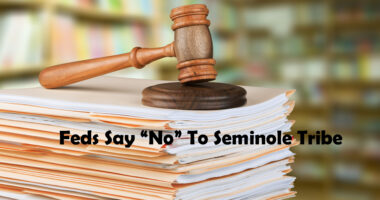Skip to content

Whenever there is a hotly contested political issue, everybody wants to put their two cents into the conversation.
The appeals case that could legalize Florida sports betting is no different.
The Seminole Tribe and the Department of the Interior filed their opening briefs on Aug. 17. However, several other interested parties chimed in on the case since then.
Last Wednesday, multiple groups representing Tribal Nations with gaming businesses filed an amicus brief with the D.C. Court of Appeals. Florida Attorney General Ashley Moody filed an amicus brief of her own that same day.
Amicus briefs are filings by groups with similar interests to the case. But they aren’t listed as the plaintiff or defendant in the case. In this instance, both filings argued for the Appeals Court to overturn the District Court ruling from last November that invalidated the 2021 Florida gaming compact and shuttered the Florida sports betting industry.
A look at Moody’s argument
In her 32-page brief, Moody’s argument consists of three main points:
- The compact does not violate the Indian Gaming Regulatory Act
- Neither the Wire Act nor the Unlawful Internet Gambling Enforcement Act provides any basis for affirming
- The District Court erred in setting aside the entire compact
Amicus briefs are not allowed to repeat arguments that relevant parties in prior filings made. While Moody’s first point was echoed in previous briefs, her rationale is slightly different.
She argued that the IGRA is clear in its language. It only authorizes sports betting on tribal land. But since the compact authorized sports betting both on and off Indian land, it doesn’t violate the law.
In her second point, Moody lays out why the agreement doesn’t violate the Wire Act or the UIGEA, which was contested in previous filings. While there were several points, the most notable was that there is no use of “a wire communication facility for the transmission in interstate or foreign commerce.”
Finally, the AG argues that even if the ‘hub-and-spoke’ model violated the IGRA, the judge shouldn’t invalidate the entire compact.
The model gave the Seminole Tribe a monopoly on the entire online sports betting market. Bets could be placed statewide, but only through the tribe’s Hard Rock Sportsbook app.
In her ruling last November, Judge Dabney Friedrich said that this aspect of the compact violated the IGRA. She then made the entire agreement illegal.
But there was much more to the compact aside from sports betting. It expanded gambling options at both Seminole-owned casinos and pari-mutuels.
The Seminoles could spread craps and roulette and pari-mutuels were permitted to offer house-backed card games. Regardless of Friedrich’s ruling, Moody believes these aspects should still be implemented.
Moody brings up Florida sports betting tax revenue
It was just one sentence out of many in her filing, and it wasn’t a central piece of her argument, but it was the first sentence in the “argument” section of her filing.
Moody mentioned the potential windfall of tax revenue her state was set to receive with the deal.
Gov. Ron DeSantis and the Seminoles agreed to the new compact in April 2021. With expanded gaming, the tribe would make at least $2.5 billion in revenue-sharing payments over the next five years. DeSantis estimated it would bring $6 billion to the state through 2030.
“The 2021 Compact provides enormous economic benefits to both the State of Florida and the Tribe,” wrote Moody. “And that compact is lawful.”
State economists remove revenue-sharing payments from the 2022 budget
Earlier this month, a group of government-employed economists released a report eliminating those payments from this year’s revenue. The economists estimated it would lose about $463 million in tax revenue this year.
It seems like eons ago, but the 2021 Florida gaming compact was law of the land for a short time. As a result, there was legal Florida sports betting for most of November 2021.
Between October 2021 and February 2022, the Seminole Tribe paid the state $187.5 million. The tribe stopped making payments once it was clear the legal process would drag out over at least a year.
However, what they would normally fork over in revenue-sharing payments is being put in a separate account. If the district court ruling is overturned, the Seminoles will send the state the entire amount.
Don’t expect sports betting amicus briefs to stop just yet
The court received two amicus briefs thus far. They should expect to obtain one more soon.
According to a report from Florida Politics, the anti-gambling group No Casinos plans on filing an amicus brief too. But don’t expect this one to be in support of the compact.
West Flagler Associates, the ownership group of two Florida pari-mutuels, filed the lawsuit currently in question. But they weren’t the only group that wanted to see the compact invalidated.
West Flagler’s main gripe was the sports betting provisions. They argued it was illegal and also hurt their own business.
On the other hand, No Casinos was going after the other gambling expansion provisions.
They claimed the compact violated Amendment 3. The amendment is a 2018 ballot initiative with support from the tribe. The amendment ensured that Florida voters would have the exclusive right to authorize casino gambling expansion. It passed by a wide margin.
Since the legislature didn’t give the voters the final say, No Casinos argued it was illegal.
The D.C. Court of Appeals dismissed the suit in June. A trio of judges said that since Friedrich already invalidated the compact, any pending suits were irrelevant.
How we got to this point
- April 2021 – Gov. Ron DeSantis and the Seminole Tribe agree to a new gaming compact that would legalize sports betting and expand gaming options at both Seminole-owned casinos and pari-mutuel facilities.
- May 2021 – In a special session, the Florida legislature passes the compact by a 97-17 margin.
- July 2021 – West Flagler Associates, files a state-level lawsuit over the compact. It argues that the ‘hub-and-spoke’ model violated the Indian Gaming Regulatory Act.
- August 2021 – The Bureau of Indian Affairs, part of the DOI, gives tacit approval to the compact after Haaland chooses to let the 45-day window expire, effectively legalizing the compact.
- August 2021 – West Flagler Associates files a nearly identical lawsuit at the federal level.
- October 2021 – Judge Allen Winsor dismisses the state-level lawsuit filed by West Flagler.
- November 2021 – The Seminole Tribe launches Hard Rock Sportsbook at the start of the month. It’s the first legal online sportsbook in Florida. Brick-and-mortar sportsbooks are legal as well.
- November 2021 – About three weeks after the tribe launches its online sportsbook, U.S. District Court Judge Dabney Friedrich rules in favor of West Flagler. She says that the ‘hub-and-spoke’ model did indeed violate the IGRA. The appeals process begins shortly after the ruling.
- December 2021 – The Seminole Tribe shuts down its online sportsbook. The move comes after a judge denies a motion to stay. The stay would’ve allowed them to continue operating the sportsbook during the appeals process.
- July 2022 – DC Court of Appeals releases the briefing schedule.
- August 2022 – Relevant and interested parties begin submitting briefs.
Proposed briefing schedule (amicus briefs are not scheduled)
| Party | Briefing Type | Due Date |
|---|---|---|
| Seminole Tribe | Opening Brief (not to exceed 10,000 words) | August 17, 2022 |
| Federal Government | Opening Brief (not to exceed 10,000 words) | August 17, 2022 |
| Federal Government | Appendix | August 17, 2022 |
| Federal Government | Answering Brief (not to exceed 7,500 words) | October 3, 2022 |
| West Flagler Associates | Answering Brief (not to exceed 15,000 words) | October 6, 2022 |
| West Flagler Associates | Amicus Brief (not to exceed 6,500 words) | October 13, 2022 |
| Seminole Tribe | Reply Brief (not to exceed 5,000 words) | November 14, 2022 |
| Federal Government | Reply Brief (not to exceed 5,000 words) | November 14, 2022 |
Photo by AP / Chris O’Meara




